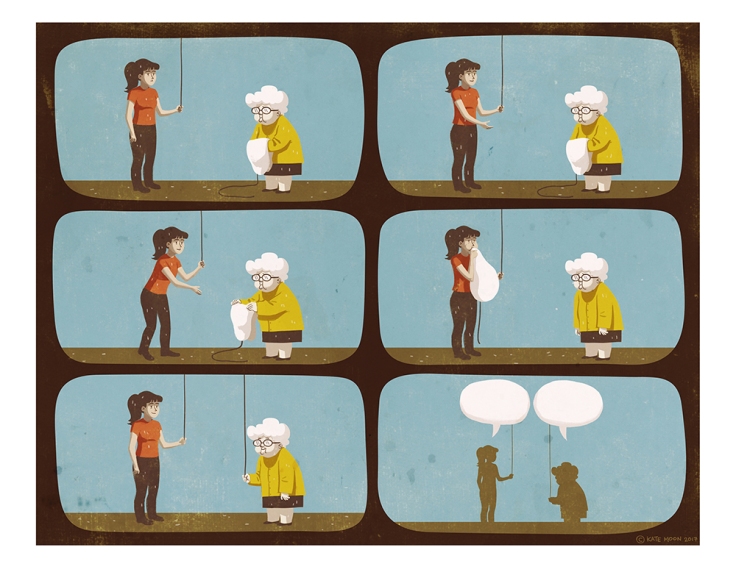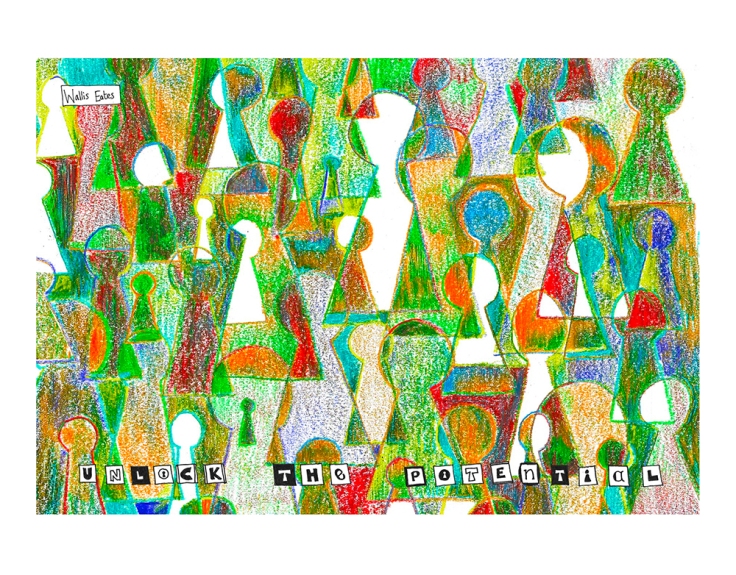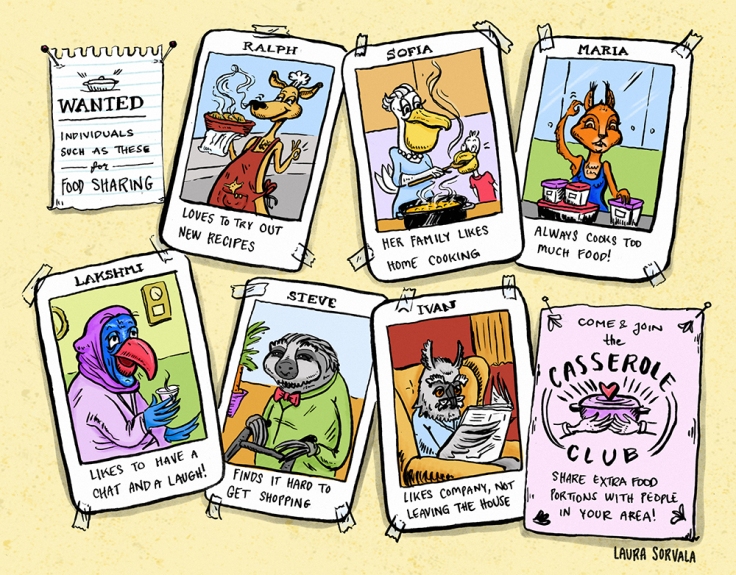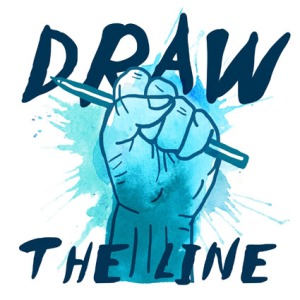With cuts to vital services for disabled people, a helping hand will make all the difference.
Whether you’re speaking up against social injustice, or just offering practical solutions, here’s how to help.
Click any of the images to see them at a larger size.

SMILE, DON’T STARE
If you see someone who looks a little different for whatever reason, don’t stare. Just like anyone else, they have feelings too.
The difference between them and you? This might the first time you’ve been in this situation; for them, it’s a constant reality.
One of our artists says, “I’m a wheelchair user and get stared at a lot, but those that just nod, smile and acknowledge me, make my day”. He suggests, “See the person not the difference”.
Image by Mirka Oinonen

EXPOSE YOUR KIDS
Make sure your children are reading books and watching movies that present a diverse range of characters and expose them to worlds outside their own.
Choose entertainment that will help shape them into true citizens of the world.
Image by Sally Kindberg

OPEN YOUR EARS
Opinions are like… ahem.
Anyway, everyone has one and we’re often eager to express them.
But when you’re speaking to someone with direct personal experience of an issue, like discrimination, take the time to let them speak, understand their experiences and reflect on their viewpoint.
Image by Miia Vistilä.

BE SOMEONE’S VOICE
There are those whose voice is easily drowned out: those with learning difficulties, the frail, the elderly, those who find language difficult.
For them, it can be impossible to get their wishes and needs expressed to doctors, the judiciary, landlords and others who have some power over elements of their lives.
Volunteer via local charities to advocate for people whose voice is not heard.
Image by Kate Moon

CHECK YOUR VOCABULARY
Daisy Hernández, author of A Cup of Water Under My Bed, says: “What are you noticing about headlines when the police kill another black teenager? Is the teen described as a kid on his way to college or as a “black male”? I try to raise awareness that we’re trafficking in racial ideology 24-7 online — and that we can change the direction of these conversations every time we hit “comment.”
Same applies across all sectors of society — from gender non-binary to disabled people, and everything in between. Pick your words with care.
Image by Victor Szepessy

RESEARCH YOUR GOOD INTENTIONS
Read up on how people prefer to be supported. Your assumptions may not be quite right.
Image by Richy K. Chandler

DIVERSIFY YOUR BOOKCASE
Seek out and read stories, books and comics created marginalised people. Recommend them to others. It’s a win-win: not only are you increasing your knowledge about a different world view, but you’re supporting the authors too.
Image by Amanda Priebe

HAVE YOUR DAY IN COURT
Your government should serve you. If you believe they have gone so badly astray from this path that they are doing actual harm, there is recourse: you can take them to court.
Yes, it takes guts; it takes money too. But it may just save the world. In the US, for example, kids are suing the government over climate change.
Image by Amber Hsu

VOTE, VOTE, VOTE
The UK group Disabled People Against Cuts say “There are 12 million disabled people in this country. If all of them over 18 voted, our world would change”.
The same goes for everyone. About 41% of eligible people didn’t vote in the recent US elections, and in the UK, 33% didn’t vote in the general election while approximately 28% didn’t take part in the EU referendum.
Image by Jenny Soep

REPRESENT EVERYONE
If you’re an artist who includes characters in their work (from cartoonist to scriptwriter to designer), make sure that you depict all kinds of people.
By showing characters who are disabled, non-heteronormative, from religious or ethnic minority backgrounds and so on, you can play a huge part in the public’s perception that all types of people as unremarkable or sympathetic.
Image by Kripa Joshi

EMPLOY THE LESS EMPLOYABLE
Could you give a job to someone who would find it hard to secure work elsewhere?
Consider recruiting from groups such as ex-convicts – giving them less reason to return to a life of crime – or those with autism, learning difficulties or disabilities, allowing them a chance for paid work that few others may offer.
Image by Wallis Eates

START A CLUB
Casserole clubs are an Aussie concept: volunteers share extra portions of home-cooked food with people in their area who aren’t always able to cook for themselves — the elderly, the disabled, the lonely. Cooks share once a week, once a month, or whenever works best for them.
Image by Laura Sorvala

SAY IT OUT LOUD
When the political narrative directly turns against your beliefs, your race, your sexuality or your lifestyle, it’s frightening.
Do you know someone who may be reading the news and feeling that fear right now? Let them know you’ve got their back. You’d be surprised how much a few words can do.
Image by Josie Pearse

BEAR WITNESS
The work of comic artists like Olivier Kugler and Kate Evans show us that documentary or reportage drawing can be a powerful tool.
As comic artists we might feel that we don’t have much to offer when faced with gross injustices, poverty, or warfare. But we can tell stories, and in a very immediate way.
A way that can change minds, soften hearts, even alter the political discourse.
Image by Sousa Machado Arts

RAISE A BETTER GENERATION
Kids are the voters of tomorrow. Let’s make sure they have some solid values and a good understanding of the way the world works.
Talk to them about unfairness in the world. Teach them equality and understanding. Help them to understand their own rights, and the rights of others. Let them know that our elected representatives are available, and how to access them when we need them.
If you feel a political figure has let you down, tell your child about that too: people are fallible, even those in power, and that’s an important lesson to learn.
Image by Rosa Devine
 All artwork on this page is licensed under a Creative Commons Attribution-NonCommercial-ShareAlike 4.0 International License.
All artwork on this page is licensed under a Creative Commons Attribution-NonCommercial-ShareAlike 4.0 International License.
RESEARCH YOUR GOOD INTENTIONS
Read up on how people prefer to be supported. Your assumptions may not be quite right.
Image by Richy K. Chandler
SMILE, DON’T STARE
If you see someone who looks a little different for whatever reason, don’t stare. Just like anyone else, they have feelings too.
The difference between them and you? This might the first time you’ve been in this situation; for them, it’s a constant reality.
One of our artists says, “I’m a wheelchair user and get stared at a lot, but those that just nod, smile and acknowledge me, make my day”. He suggests, “See the person not the difference”.
Image by Mirka Oinonen
EXPOSE YOUR KIDS
Make sure your children are reading books and watching movies that present a diverse range of characters and expose them to worlds outside their own.
Choose entertainment that will help shape them into true citizens of the world.
Image by Sally Kindberg
OPEN YOUR EARS
Opinions are like… ahem.
Anyway, everyone has one and we’re often eager to express them.
But when you’re speaking to someone with direct personal experience of an issue, like discrimination, take the time to let them speak, understand their experiences and reflect on their viewpoint.
Image by Miia Vistilä.




